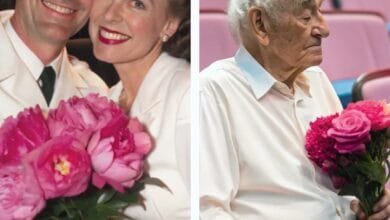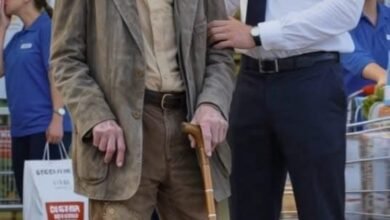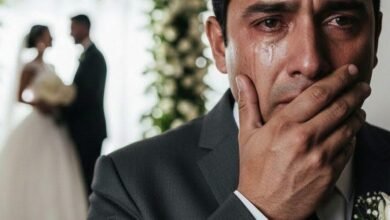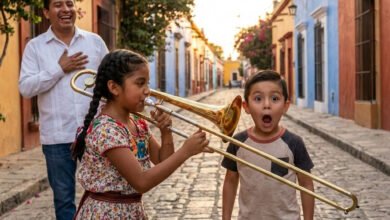The children ran ahead, but then I saw them halt and turn back.
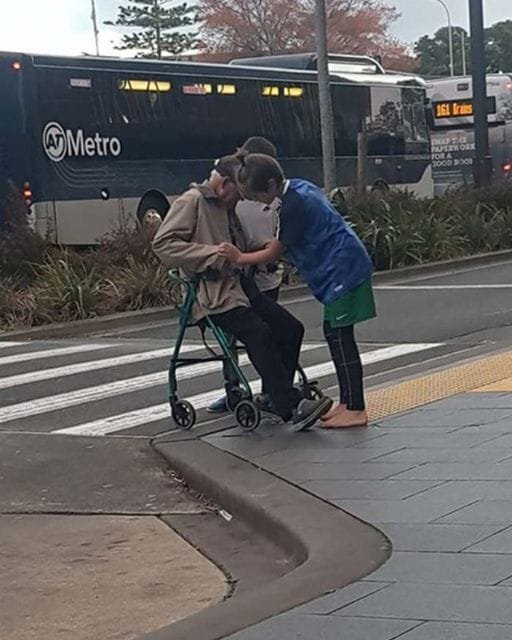
“What else did he tell you?” I asked.
“He said that when people help each other, it keeps the world from falling apart,” Milo replied, glancing up at me.
That line struck me. Maybe because it came from a stranger. Or maybe because my sons—who normally couldn’t sit still for five minutes without bickering or throwing snacks at each other—had stopped everything for him. I’m not sure exactly why. But watching two small anchors steady themselves to support someone else moved something in me.

Life continued, and we kept walking. But I couldn’t get that man out of my head—the tremble in his voice when he thanked them, the lines on his cheeks, and the thick calluses on his aged hands. He didn’t come across as pathetic. Just paused. As if he’d been waiting for someone to notice he was still there.
That night, while my wife and I folded laundry and dodged a Nerf dart war in the living room, I told her what had happened. She gave that particular smile—one she uses when she’s proud but doesn’t want the boys to hear and get too full of themselves. “You’re raising good men,” she said.
It warmed me. It really did.
The next afternoon, after soccer practice, Tyrese asked if we could stop by the crosswalk. “Just to check if he’s there,” he mumbled. I hadn’t expected him to remember—let alone want to go back. “Sure,” I said.
He wasn’t there.
Two days later, we went again. Still nothing.
After a week, I figured that was it.
But then, on the third Sunday, as we were leaving the donut shop down the street, Milo tugged at my sleeve. “Dad,” he said, nodding toward the corner.
He was there. Same walker, same light jacket—but it looked a bit cleaner now. This time, though, he wasn’t struggling. He was sitting, chatting with a woman who handed him a small cup of coffee. They were laughing like old friends.
We didn’t stop. We just watched for a bit. Tyrese smiled. “He looks better.”
I nodded. “He does.”
“Do you think we helped him?” Milo asked.
“I think you did,” I said. “I think you made him feel like he wasn’t invisible.”
Weeks passed. School resumed. Tyrese developed a sudden obsession with baseball. Milo became fascinated with collecting odd-shaped rocks, calling them “meteorite fragments.” It was a while before we saw the man again.
Then came the school’s “Family and Community Day.” One of those events where local folks shared stories and parents were invited to view student projects. I barely made it—juggling a work deadline. As I slipped into the back of the gym, I spotted Tyrese on stage, holding a microphone.
He wasn’t talking about his new cleats, or baseball, or the game-winning goal. He was talking about the day at the crosswalk.
“He said people walk past him all the time,” Tyrese said, his voice steady. “But after we helped him, it was like he remembered who he used to be.”
Next to him, Milo held up a pair of sneakers and a poster board with a drawing of a soccer ball. He said the man had played in a local league before his injury. He had a brother. And he was so fast they used to call him “Rocket.”
The gym went quiet. Really quiet. Somewhere near the juice table, a little kid coughed.
Then Tyrese said, “We don’t know his name. But we still think about him. And when we’re not around, we hope someone else helps him too.”
Afterward, a few parents came up to me. One mother, tearful, said, “I hope my son grows up like yours.”
That night, I got curious. More than curious—motivated. The idea that this man, this so-called “Rocket,” was still out there stuck in my head. I went into full detective mode, something I hadn’t done since college.
I asked around. Started at the poolside community center. Then the Thursday senior rec group. Eventually, I was directed to a veteran’s housing complex just two blocks from the crosswalk.
I showed up with a basket of oranges and asked at the front desk if they knew of an older man who used a walker and might have played soccer.
The receptionist narrowed her eyes. “Mr. Calder, you mean?”
I didn’t know the name. But I nodded anyway.
She smiled. “Yeah, we call him Coach. Hang on.”
A minute later, a staff member led me to a small common room where four men sat laughing over a battered Uno deck. One of them looked up—and I recognized him immediately.
He grinned. “Hey. You’re the dad.”
I blinked. “You remember us?”
He laughed. “Hard to forget two kids who save you from traffic and then bow like you’re royalty. Sit down.”
We talked for an hour. His name was Walter Calder. He’d been a youth soccer coach for over two decades. Lost his mobility due to a spinal condition that went untreated too long. Lost his brother in an accident. He admitted he’d been in a dark place—but said that day at the crosswalk changed him.
“It felt like I mattered again,” he said. “Like someone saw me and realized I wasn’t just an old man in a chair.”
After that, he started visiting the park more. A woman from the community center asked him to help lead a walking club. He even started working in an after-school program where he taught kids passing techniques from his chair.
I left with his phone number, two coaching tips for Tyrese, and a plan to bring the boys to visit the next weekend.
The boys lit up when I told them. Tyrese ran to grab his old ball. Milo just smiled and said, “Told you we helped.”
From then on, we visited Coach Calder every Sunday. Sometimes he brought stories. Sometimes we brought snacks. He told me about games he’d coached in the 1970s that sounded more like epic battles than sports. He taught the boys drills and strategies. Eventually, my wife joined us too, bringing cookies he pretended not to like—but always took seconds of.
A year later, when our local rec league needed a new assistant coach, Tyrese nominated him. They gave him a foldable chair with his name on it, a whistle, and a clipboard.
Coach Calder cried.
So did I.
Looking back, it’s wild how a seemingly small moment—two kids helping a stranger across the street—became something so big. A friendship. A second chance. Maybe even a legacy.
It all started with one pause. One choice to care.
So I guess what I’m asking is: Who might be standing at the edge of your crosswalk?
If this story touched you, please share it. You never know who might need the reminder. 💙

